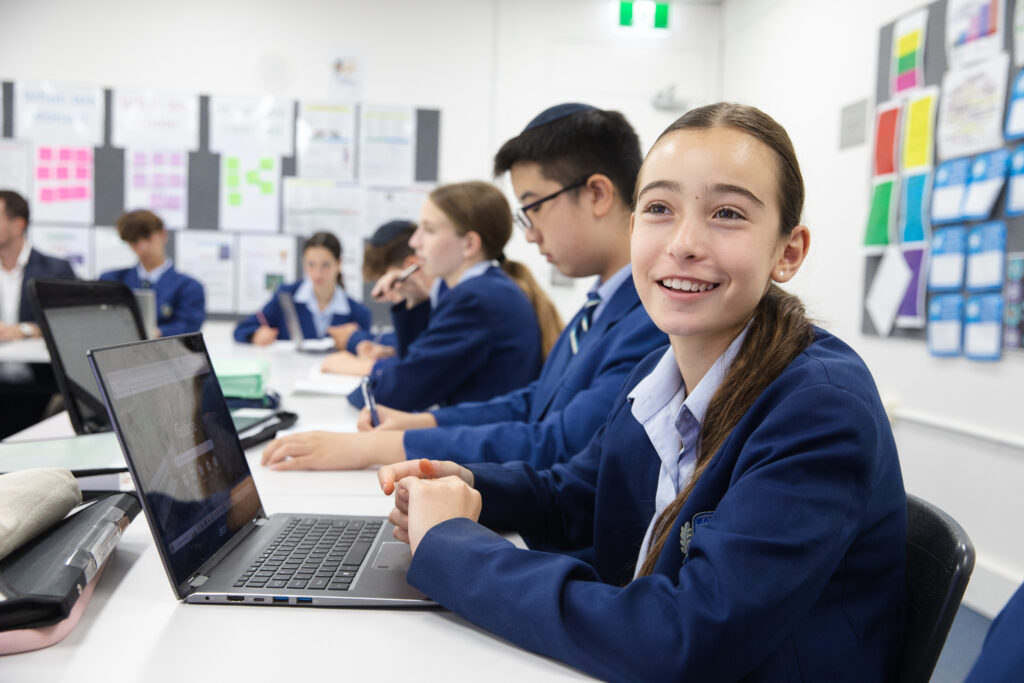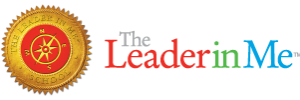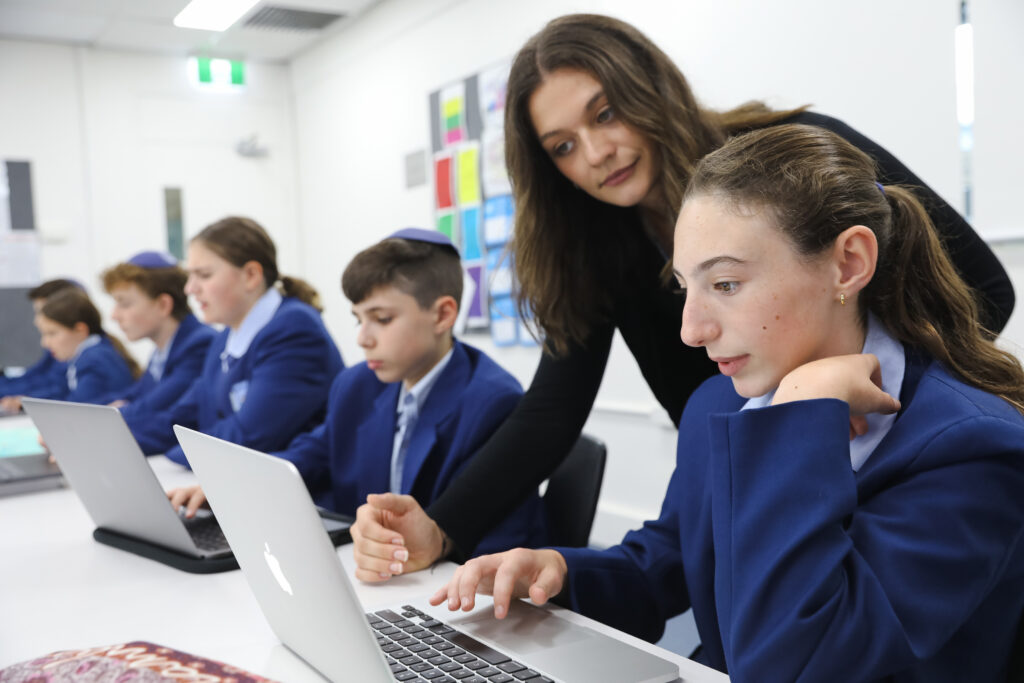Educational Philosophy
A Culture of Thinking, Leader in Me and Academic Care at Masada College

A Culture of Thinking
Taking our inspiration from the Project Zero research team at Harvard University, our Culture of Thinking has two goals: to nurture students’ thinking dispositions, and to deepen their understanding of content. We help our students develop curious, reflective and critical mindsets, encouraging them to notice thinking and learning opportunities and become eager to take them.
At its core, the Culture of Thinking is about developing dispositions to apply thinking skills while making use of routines to encourage this way of learning. For example, the “See- Think- Wonder” routine is not an activity set for a certain date, but a method which encourages children to describe, interpret and ask questions about the content of their courses. It also means being flexible with thinking so that students are open to ideas from their peers and answer questions such as ‘what makes you say that?’. It’s not a program that we implement – it’s a Culture of Thinking.
In the classroom, this means that teachers are encouraged to create environments where students make their own connections and conclusions and most importantly, feel safe doing so; where they become an active part of the learning process, realising that learning doesn’t happen to us, but rather, it happens with us.
Masada was one of the earliest adopters of this pedagogy and have now become renowned for it, with other schools coming to us for our Critical and Creative Thinking Courses.
While Ryan Gill, Head of Teaching and Learning Years 7-12 and HSIE Department teacher and Carla Gagliano, Head of Teaching and Learning ELC to Year 6 and Year 2 class teacher, spearhead Masada’s Culture of Thinking, all teachers are involved in study groups which meet fortnightly to discuss how to achieve the teaching goals they’ve set for themselves. Skills such as problems solving, coordinating with others, critical thinking and people management are all acquired by immersing students in a Culture of Thinking, resulting in us producing students who stand out for their confidence and the diversity of their thinking.

The Leader in Me
At Masada College we aim to equip our students with the tools to develop life skills and personality traits that will guide them through life in the 21st century. Stephen Covey’s The Leader in Me® program, which is part of our Leading Learning educational package, strongly supports this aim.
Through The Leader in Me® program, each student is introduced to the 7 Habits of Highly Effective People, enabling them to learn to:
- Take responsibility for their actions (be proactive)
- Set goals (start with the end in mind)
- Prioritise (first things first)
- Resolve conflicts (win-win)
- Build effective interpersonal relationships (seek first to understand and then be understood)
- Communicate effectively with others and work as a team (synergise)
- Have a balanced lifestyle (sharpen the saw)
- Create their own vision for success (mission statements)
Not only does incorporating the common language of the 7 Habits into the curriculum as well as into playground activities deepen our students’ understanding of the values that underpin Masada College, it gives them the EDGE they need when they leave the comfort of Masada’s doors and enter the workforce as confident, secure and successful adults.
Academic Care at Masada College

Student well-being underpins the educational experience of all students at Masada College, ELC – Year 12. The College prides itself on a whole school approach, acknowledging that well-being can be influenced by a number of factors, which can impact a student’s learning and connectedness to the classroom.
Academic Care uses the school’s existing organisational structures of classroom teachers (ELC – Y6) and Year Patrons (Y7 – Y12) to promote well-being in an inclusive environment. The College believes all educators are teachers of well-being and are responsible for ensuring that students’ needs are met in a nurturing and supportive environment. Our student well-being program is based on the College ethos and is delivered through a variety of structured programs and experiences.
In the Senior School, each year is cared for by their Year Patron who is the link between students, staff and parents. It is the patron who greets students on their first school day, provides them with buddies if they join throughout the course of the year and accompanies students on camps. Patrons keep a close watch on not only the academic needs of their students but also their emotional and social needs. The patrons also hold a fortnightly meeting with all the staff during which the progress of each student is discussed, ensuring we are proactive rather than reactive. Prior to commencing in Year 7, the patron organises an orientation program in Term 4 as part of our Transition to Senior School program. In addition, in the first weeks of Year 7, patrons take the cohort on a three- day camp which allows students to build relationships with each other and with staff.
Each year group also has a weekly meeting time with their patron, where issues can be discussed and where students are engaged in appropriate programs that cover topics such as study skills, stress management, cyber safety, healthy relationships as well as drugs and alcohol awareness. Students are also addressed by industry professionals specialising in adolescent development and wellness. Academic Care also affords students the opportunity to participate in horizontally-grouped club activities whereby students pick from a range of activities that encourage them to “switch off” from technology and engage with an activity they enjoy or would like to try, such as yoga, sign language, mindful colouring, languages, rock band and opportunities for volunteering within the community.
In addition, our Senior School Learning Support Team, led by our college counsellor, works with students with specific additional needs. These needs are diverse and range from issues with handwriting, perceptual difficulties and comprehension issues to difficulty with breaking down assignments.
At Masada College we aim to equip our students with the tools to develop life skills and personality traits that will guide them through life in the 21st century; it’s just one example of the EDGE we provide our students at the HIVE of Potential. Stephen Covey’s The Leader in Me® program, which introduces students to the 7 Habits of Highly Effective People, is part of our Leading Learning educational package and strongly supports this aim.
In the Junior School, The Leader in Me® program provides a common language and key tools to guide our students to be self-motivated and directed, as well as equipping them with organisation, planning and relationship- building skills. Through this program we aim to develop our students’ confidence and have each child recognise the leader within themselves. These habits are further enforced through our weekly PDH (Personal Development and Health) lessons, assemblies, playground interactions and conversations. Students are also reminded of these steps within our behaviour management plan through completing reflection forms which encourage them to learn from their mistakes.
While all students have access to our school psychologist and are supported by targetted interns from Macquarie University as well as learning- enrichment teachers, Masada College has become renowned for our unique Individual Plans which ensure that we are catering to the social, emotional and academic needs of our children. This encompasses meetings between parents, external specialists working with the family and the literacy and numeracy teacher/s spending time evaluating the best way to provide for the child’s needs. It is a concentrated time during which we work in partnership with other facilitators to support each other and better understand the student.
In this way, Academic Care encompasses all aspects of education, from ensuring students are performing to the best of their abilities in the classroom to fostering life skills that will serve them for years beyond graduation.
or Tour
